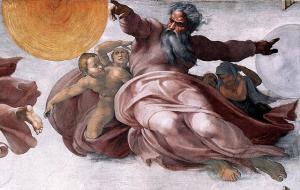
God created everything, making it all good. To be sure, it is not good in and of itself, that is, creation did not give itself its goodness. Rather, it is a gift given to it by God. Nothing comes from nothing. God brought everything into being, granting it a share in God’s own goodness. Insofar as anyone or anything participates in that goodness, it can be said to be good. Due to this goodness, God sees something in creation, in everything and everyone on it, worthy of preservation, which is why God makes sure creation does not annihilate itself. Nothing which comes into existence will be lost for eternity; God remembers it all, and in God’s memory, it is not only preserved, but able to thrive, having an existence (and a life) of its own. We were not made for perdition, but theosis:
For I say that man was made not for destruction, but for better things. For if he were made as any of the elements, or those things which render a similar service to God, he would cease to receive a reward befitting deliberate choice, and would be like an instrument of the maker; and it would be unreasonable for him to suffer blame for his wrong-doings, for the real author of them is the one by whom he is used.[1]
This is why it is wrong to think of predestination as God forcing someone to suffer eternal perdition. God is love, and God’s love loves the goodness found in creation. All creaturely subjects, such as human persons, are given free will, and with it, the freedom to decide whether they will embrace God’s love for them and discover the blessings which can be had in that embrace, or to deny that love, and to discover the kind of existence which is had when that love is actively denied. God’s laws or commandments are given to us to help direct us when we find it difficult to know what to do; we must not engage them in a legalistic, rigoristic fashion, but rather, understand how they connect to the way of love, so we can transcend them and experience true goodness. When we do not understand this, we can then find ourselves using the letter of the law against its spirit, denying the way of love, and in doing so, finding ourselves embracing the way of unlove, the way of sin: “The true nature of sin consists in a human person’s refusal to love God and neighbor unselfishly. It is slavery to the self-centeredness into which we are born.” [2]
Even when we have failed to live our lives according to the dictates of love, God still loves us. Sin does not completely defile and destroy the good in us. God wants us to love, to embrace love, and so, even when we have failed love, God will welcome us back and help us if we but repent and change our ways, that is, if we seek and do what we can to follow the path of love. When we are open to such change, but find it difficult to overcome the bad habits we have developed, God will welcome us; we must not let those habits cause us to despair. God will help us as we work to counter those habits, giving us the grace we need to slowly reverse them, as well, of course, as to forgive us so long as our bad habits have not been completely overcome. While some people might, through grace, find it easy to change, and stop what they have been doing wrong, we must not assume, if that is not the case for us, we are not receiving grace. Most people will have at least a few habits which they have to work against, and it will take them all their temporal existence (if not beyond) to truly purify their will. Thus, God will provide us the grace we need, which, if we cooperate with it, will strengthen us and our resolve so we can grow in love and do what love expects of us, and it is this growth which is important:
Therefore, since we have received a commandment that, turning away from evil, we should do what is good, see how in both of these things the Spirit assists our weakness. There are varieties of gifts, but the same Spirit. And so, turning away [from evil] the Spirit brings about the three things in us: compunction, petition, and forgiveness.[3]
We are to embrace our goodness, to maintain the innocence which is found in love; this means we are to do more than merely avoid unjustly harming other people, but, we must love others (and ourselves), doing what we can to help everyone through equity:
So when it says, Maintain innocence, it has commanded that we keep ourselves from harming anyone, injuring anyone. Moreover, we achieve this if we, with a mind ever attentive and vigilant, see equity. Thus, I understand Equity in this passage to be like Truth, Justice, Life; that is, Christ. For by seeing these in conjunction with one another, we will see God. [4]
Works of piety and charity, works of justice, are expected of us. We can say we believe in the equal dignity of everyone, but that remains mere words, mere theory, so long as we do not act on it. We must make sure everyone receives their proper share of the common good. We must make sure those who are greedy and selfish do not have the power or means to unjustly take from those in need. When we find the system itself has reinforced iniquity, that is, established systemic structures of sin, which the greedy, the selfish, those with bad will, use to benefit themselves at the expense of others, we must fight against those structures of sin so that equity can prevail:
The things that you refer to as works of piety and mercy are necessary in this age, as long as iniquity continues to dominate. Their practice would not be called for even here were there not an overwhelming number of poor, needy, and sick people, which is the result of the wickedness of men who have seized for their own use – but not used – those things that were bestowed upon all by the Creator of all. 5. As long as such iniquity is rampant in this world, then, this behavior will be necessary and beneficial to the one who practices it, crowning a good disposition and a pious will with the reward of an eternal legacy. But this will cease in the world to come, where equity will rule and when there will no longer exist the inequity that made these things obligatory. Then everyone will pass over from this multiform or practical activity to the contemplation of divine things in perpetual purity of heart. [5]
Iniquity will give way to equity in the eschaton; those who undermine the work of equity, those who fight against it, are workers of iniquity, undermining God’s justice. They undermine the common good. Even though there will be no temporal utopia, and that full justice will be realized only in the eschaton, we must do what we can to bring justice to the world. We must never stop doing what is needed to bring about more and more equity into the world, which is why we cannot embrace some sort of quietist retreat from the world, thinking we can avoid our responsibility to the world and just sit back and enjoy the gifts found in quietude. God created the world good, but God made us to be stewards of creation. God expects us to help preserve and develop that good. We must not, of course, go from one extreme, that is, just as we must not retreat from the world, to end up embracing another extreme, such as that found in integralism. We must not think the way to bring equity into the world is to dominate and control it with an iron fist, promoting a legalistic interpretation of God’s commands. Such integralism is as abhorrent as a retreat from the world. It denies freedom, the freedom God gives us so that we can make of ourselves as we will. It seeks to take that away from us and give it to those in positions of power and authority. Truly, what we need is the middle path, the path of love, the path which promotes equity, recognizing it is had only in and with freedom. God gave creation, and with it, all creaturely subjects, its freedom. We are to embrace that freedom and use it to promote the greater good, the one which is found in love, where everyone comes together freely in and through that love.
[1] St. Methodius, “Concerning Free Will.” Trans. William R. Clark in ANF(6):362.
[2] George A. Maloney, SJ, Your Sins Are Forgiven: Rediscovering the Sacrament of Reconciliation (New York: Alba House, 1994), 17.
[3] St. Bernard of Clairvaux, Sermons for the Summer Season. Trans. Beverly Mayne Kienzle and James Jarzembowski (Kalamazoo, MI.: Cistercian Publicans, 1991), 70-71 [Pentecost: Sermon One].
[4] Origen, Homilies on Psalms 36-38. Trans. Michael Heintz (Washington, DC: CUA Press, 2023), 166 [Homily 5, Psalm 36 [37]].
[5] John Cassian, The Conferences. Trans. Boniface Ramsey, OP (New York: Newman Press, 1997), 49 [First Conference; Abba Moses].
Stay in touch! Like A Little Bit of Nothing on Facebook.
If you liked what you read, please consider sharing it with your friends and family!
N.B.: While I read comments to moderate them, I rarely respond to them. If I don’t respond to your comment directly, don’t assume I am unthankful for it. I appreciate it. But I want readers to feel free to ask questions, and hopefully, dialogue with each other. I have shared what I wanted to say, though some responses will get a brief reply by me, or, if I find it interesting and something I can engage fully, as the foundation for another post. I have had many posts inspired or improved upon thanks to my readers.













